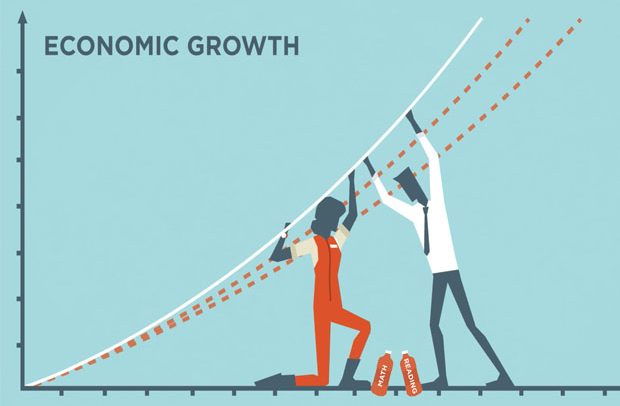New Era Africa (NERA), an economic think-tank, has disclosed that the lives of ordinary Ghanaians have not improved despite strides made by government in the management of Ghana’s macroeconomic fundamentals over the past 22 months.
According to NERA, government must find a reasonable balance between ensuring favourable macroeconomic fundamentals and improving the standard of living of the people.
Commending government for allotting about GH¢200 million to MASLOC, it said “this will improve the activities of informal sector operators just that the management of MASLOC must ensure monies allotted them to be disbursed as loans are paid back.”
“The 2019 Budget shows that government in this fiscal year will embark on aggressive expansionary fiscal policy.
“The Bank of Ghana (BoG) must therefore critically balance its inflation targeting objective with the expansionary fiscal policy of government so that the macroeconomic fundamentals are not thrown off balance.”
GDP target
It said that the 7.6 percent GDP growth rate for 2019 fiscal was achievable since there was going to be a massive investment in infrastructure, planting for food and jobs and rearing of livestock for food and jobs.
“All other things being equal, with a sanitized banking sector, coupled with a business friendly environment and private sector friendly policies, the GDP growth rate target for 2019 is achievable.
“The overall budget deficit as a percentage of GDP targeted at 4.5% in 2018 ended in rebased series at a rate of 3.0%. The reduction in budget deficit was attributed to the cap by IMF, as well as the austere fiscal policies implemented during the year under review. It’s therefore expected that in 2019, the government will again achieve its target of keeping deficit within the range of 3% – 5%, as it did in 2017 and 2018.”
Revenue targets
“The government seeks to raise GH¢58.9 billion revenue envelope to finance its 2019 budget. Though this represents about 25% more than the 2018 revenue realized and government has for the past two years achieved either a 15% or 20% improvement of the previous revenue figure, this revenue target is therefore admission of government’s weakness in raising revenues as promised in 2016 electoral campaign and budgets in 2017 and 2018.
“It further shows government’s weakness in effectively digitizing the economy and leveraging same to raise substantial property rates, rent tax and capturing the chunk non-tax paying informal sector operators within the tax net.”
Expenditure
Commenting on government’s expenditure for next year, it said GH¢73.4 billion (in excess of 58.9 billion revenue target) constitutes the expenditure budget. Out of this, GH¢19.4 billion is earmarked for wages and salaries, GH¢6.3 billion for goods and services, GH¢18.6 billion for interest repayments of which 77% constitutes domestic repayments and GH¢8.5 billion CAPEX (2.5% of GDP). This GH¢18.6 billion represent about 45% of domestic tax revenue.
“This shows the dire debt stress we find ourselves as a country. Although the GH¢8.5 billion CAPEX budget is an improvement over the 2018 figure. However, looking at our needs, it’s still inadequate. Out of the CAPEX budget, GH¢3.2 billion constitutes the domestically financed CAPEX. That means the country will generate more loans in the future in order to fund CAPEX.”
Debt management
NERA revealed that if the expenditure budget exceeds revenue target for 2019, the nation would have to find GH¢14.5 billion cedis to finance deficit.
“Per the budget, this gap will be financed by issuing GH¢9.6 billion worth of sovereign bond and GH¢4.8 domestic debts. After the rebasing, the debt to GDP ratio has moved from little below 70% in 2017/2018 to 57.4% (including debt issues to finance the banking mess).
“In the case of Ghana, the GDP base is expanding but the Tax to GDP ratio has plummeted to 12%. This means while debt to GDP stands at 57%, proportion of Tax revenues in relation to GDP is 12%, hence any increase in borrowing without aggressively mobilizing revenue will put the economy back to its existing situation (high debt to GDP ratio; distress situation) before rebasing.”
By Samuel Boadi


